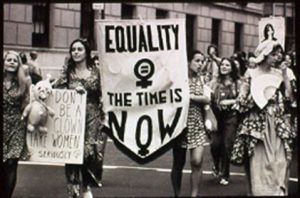 The Equal Rights Amendment
The Equal Rights Amendment
- Section 1. Equality of rights under the law shall not be denied or abridged by the United States or by any state on account of sex.
- Section 2. The Congress shall have the power to enforce, by appropriate legislation, the provisions of this article.
- Section 3. This amendment shall take effect two years after the date of ratification.
In 1919, the U. S. Congress passed the 19th Amendment, which states the “right of citizens of the United States to vote shall not be denied or abridged by the United States or any State on account of sex.” It was ratified the following year, bringing a culmination to the Women’s Suffrage Movement. By 1923, Alice Paul who had been in Suffrage Leadership introduced the Equal Rights Amendment to Congress. It took another 49 years to get the ERA passed by Congress so that it could be sent out to the states for ratification.
By June 1982, the deadline for three quarters of the state legislatures to ratify the amendment, the supporters of the amendment had maneuvered ratification by 35 of the 50 states — three states short of the required 38 to make it a part of the U. S. Constitution. Since then, the ERA has been introduced every two years, into every Congress.
One of the most vocal and persuasive opponents of the ERA during the effort for ratification was Phyllis Schlafly, an American constitutional lawyer and conservative activist. In 2007, Schlafly summed up her arguments against the Amendment in a letter to the Los Angeles Times by stating it would
- “…require women to be drafted into military combat
- …abolish the presumption that the husband should support his wife and take away Social Security benefits for wives and widows
- …give federal courts and federal government enormous new powers to reinterpret every law that makes a distinction based on gender, such as those related to marriage, divorce and alimony.”
Supporters of the ERA could respond to these charges with “Precisely. That’s what we want.”
Today, supporters of the ERA can show that laws and courts in the varied 50 states that discriminate and harm the lives of women could be challenged by the existence of an Amendment to the Constitution that prohibits both. The documentary “Equal Means Equal,” written, produced, and directed by actress and filmmaker Kamala Lopez, looks at the following legal and social topics of import to women:
- Rape, Sexual Assault
- Foster care & Child Sex Trafficking
- Reproductive Health Care
- Pregnancy Discrimination
- Wage Discrimination
- Domestic Violence
- Female Incarceration
- Female Poverty
- And the roll of the United States as a leader in International Women’s Rights.
Elaboration on how a constitutional amendment would impact these issues and topics can be found in the documentary and at equalmeansequal.com.
On Jan. 17, 2017, Sen. Benjamin Cardin (D-MD) introduced Senate Joint Resolution 5, followed on Jan. 31 by Rep. Jackie Speier (D-CA), which asserts that the ERA will become part of the U. S. Constitution “whenever ratified by legislatures of three-fourths of the States.”
AAUW contributed to this documentary and continues to fight for the ratification of the ERA. AAUW continues to be a part of what Schlafly called those “…pushy women’s organizations, a consortium of 33 women’s magazines, numerous Hollywood celebrities and virtually all the media.”
